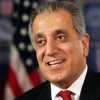Zalmay Khalilzad

Zalmay Khalilzad
Zalmay Mamozy Khalilzadis a U.S. counselor at the Center for Strategic and International Studiesand president of Khalilzad Associates, an international business consulting firm based in Washington, D.C. He was the United States Ambassador to the United Nations under President George W. Bush. He has been involved with U.S. policy makers at the White House, State Department and Pentagon since the mid-1980s, and was the highest-ranking Muslim American in the Administration of U.S. President George W. Bush. Khalilzad's previous assignments in...
NationalityAmerican
ProfessionPolitician
Date of Birth22 March 1951
CountryUnited States of America
During the Cold War era, the issue was the containment of Soviet influence, and we tolerated many an authoritarian regime as long as they were useful to us in this respect.
We're dealing with such enormous problems today that we have no other choice but to work together. If Iraq fails, if a religious civil war breaks out and the neighboring states are drawn into this conflict, if the Kurds declare independence and al-Qaida takes over an entire province - that's when the consequences will be dramatic.
The terrorists want civil war. Al-Qaida is attacking Shiites. The Shiite militias are taking revenge on the Sunnis. And the Sunnis are become more extremist, with some joining al-Qaida.
Everyone believes that the prospect for a civil war has diminished significantly over the past several days. All the mainstream leaders of Iraq believe that civil war must be avoided. It's very positive that they are all saying it.
Everything that needs to be done must be done to avoid a civil war, and I think they are keenly aware of the danger.
At this point the determination is to meet the August 15 deadline.
We will help them if our help is needed. They will have to decide if they need help or not.
This not only opens the door for insurgents to permanently renounce violence and join the political process in order to stabilize Iraq, it also isolates the terrorists who are the enemy of all Iraqis, while setting the stage for the emergence of a strong and independent Iraq.
Since no single party will have a majority there will be a need for a very broad-based coalition.
I think American impatience has to do with the notion that we don't know what we're doing. If we could project that we are moving in the right direction, Americans are ready to be very patient.
That will bring down the total level from 17 brigades to 15.
It is critical that the newly elected leaders of Iraq do their part by forming a government of national unity with a good program and competent ministers as soon as possible.
It is a moment of danger but also a moment of opportunity.
We're going to press very hard for this.